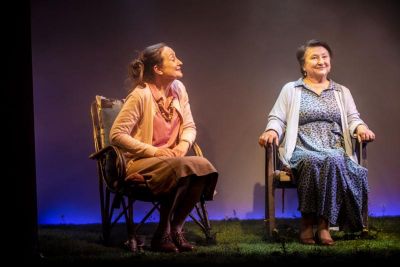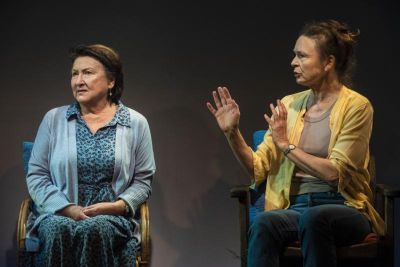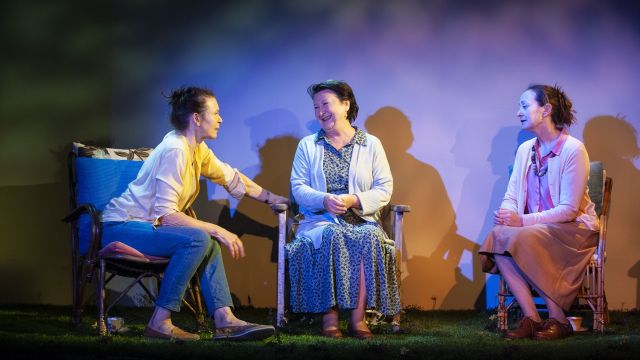Escaped Alone
Just under a sunny, ‘normal’ surface lurk horrors large and small, past, present and future. Three middle-aged women, seemingly old friends and comfortable together, have afternoon tea in a sunny back garden. A fourth woman is passing and sees them through a hole in the fence. They ask her to join them. The three are identified by their first names – Lena (Marta Kaczmarek), Sally (Caroline Lee) and Vi (Margaret Mills) – but the newcomer is Mrs Jarrett (Julie Forsyth) and she never quite fits in or keeps up… The play begins, however, with a Voice Over from Mrs Jarrett, before she enters, so is Escaped Alone Mrs Jarrett’s story? She certainly knows – or predicts – more than the others know – or perhaps want to know.
All four characters are clearly delineated in manner, speech patterns and attitudes. They are not always nice to each other and there are some telling barbs en passant – but if feelings are hurt, it is fleeting – apparently. The relaxed tone is disarming. At one point, the four breaks into an A Capella version of The Crystals' 1963 hit Da Doo Ron Ron - an indicator of a shared past. The text specifies that they are ‘all at least seventy’, but I don’t think that’s true of this marvellous cast. In addition, director Jenny Kemp and designer Dann Barber have dressed the three old friends like comfortably off eastern suburbs types – and distinguished Mrs Jarrett by her rougher, less stylish attire – as well as her less polished, working class (?) voice.
 There are a lot of lines that would seem, on the page, to end perhaps with three dots or possibly a dash, indicating that the speaker has stopped – for whatever reason – or been interrupted. It’s a characteristic of Caryl Churchill’s writing. As three of the characters are supposedly old friends, you might expect them to finish each other’s sentences. But they never do – subtly emphasising the actual isolation, each from each. But here, curiously, director Jenny Kemp has her cast break flow, so to speak, and pause between the incomplete sentences and thoughts. One might guess at the intention behind this – to emphasise the unreality of the real? – but the effect is to make much of the dialogue seem stilted and the musical ebb and flow is lost – as well as losing the contrast between ‘normal’ and nightmare.
There are a lot of lines that would seem, on the page, to end perhaps with three dots or possibly a dash, indicating that the speaker has stopped – for whatever reason – or been interrupted. It’s a characteristic of Caryl Churchill’s writing. As three of the characters are supposedly old friends, you might expect them to finish each other’s sentences. But they never do – subtly emphasising the actual isolation, each from each. But here, curiously, director Jenny Kemp has her cast break flow, so to speak, and pause between the incomplete sentences and thoughts. One might guess at the intention behind this – to emphasise the unreality of the real? – but the effect is to make much of the dialogue seem stilted and the musical ebb and flow is lost – as well as losing the contrast between ‘normal’ and nightmare.
At any rate, the women chat about past experiences, how the district has changed and future plans – with Mrs Jarrett rather struggling to contribute and never quite hitting the right note. Without ruffling the ‘normal’, relaxed surface, Vi talks calmly of having stabbed her husband to death – ‘accidently’ – and spending six years in gaol. The others seem to know about this, but no one is fussed. That is how this mysteriously intriguing and somehow gripping play works. I cannot believe that there is a single word that has not been carefully considered and precisely chosen.
In sudden monologues in which each speaker is isolated by Rachel Burke’s lighting, shocking or bizarre secrets and anxieties are revealed. Lena suffers from agoraphobia and depression. Sally has an excessive-to-the-point-of-crazy fear of cats. Most disturbing – and not at all funny – is Mrs Jarrett’s ‘terrible rage’. These monologues are not ‘storytelling’; they are reveals within a context and yet what is revealed – leaving aside Vi’s murder of her husband – elicits no reaction from the others.

But Mrs Jarrett goes further. Each time signalled by a sudden and frightening lighting change, the three old girls disappear, and Mrs Jarrett is all at once alone, right downstage, off the raised rostrum that is the backyard and in blazing light directed at us. There, half modern Cassandra and half stand-up comedian, Mrs Jarrett delivers stern visions of a ghastly, worse-than-dystopian future that is uneasily ‘funny’ and surreal, but – such is the calculated skill of the writing – no less horrifying, no less terrifying for all that – a future world of huge flood and winds, hailing rocks and mass starvation made acceptable by mass media.
(The one production element that just slightly undermines this startling element is that Ms Forsyth has to get down off the rostrum, deliver her warnings and then scoot back to her position with the other three before the lights come up on them.)
Escaped Alone – its title echoing the Book of Job and Moby Dick (the narrator Ishmael ‘alone escaped to tell the tale’) – at a mere fifty-five minutes, is, under its controlled humour and clear characterisation, a cold, clear-eyed warning about the future as we sit in sunny backyards enjoying an uncomprehending chat and a nice cup of tea.
Michael Brindley
Subscribe to our E-Newsletter, buy our latest print edition or find a Performing Arts book at Book Nook.

